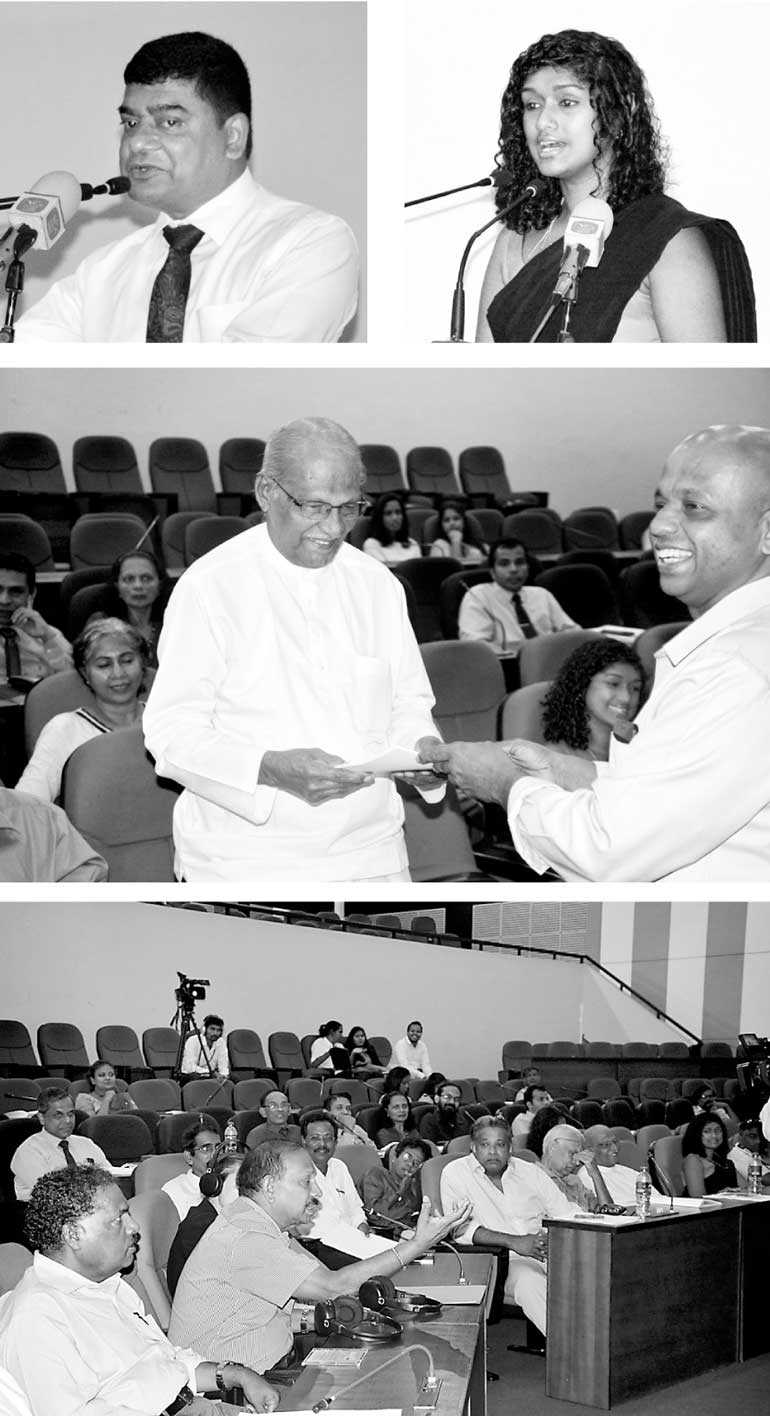Friday Feb 27, 2026
Friday Feb 27, 2026
Saturday, 17 November 2018 00:00 - - {{hitsCtrl.values.hits}}

By N. Sarasi
“Only about 5% of applications for information are having to reach the appeals stage at the RTI Commission,” according to Human Rights Lawyer, activist and RTI Commissioner S.G. Punchihewa, speaking at the recent launch of the Report on a study carried out on the progress of effective implementation of the Right to Information (RTI) Act. He said that this was a positive sign, and meant that the vast majority are being handled effectively at the regional level.
Punchihewa was part of the panel speaking on the launch held 27 September by a leading local civil society organisation, the Centre for Policy Alternatives (CPA), which had been at the forefront of advocacy for RTI for over 15 years with its initial involvement in providing expert input into the drafting of the Act. The report contained progress of a number of RTI applications made in conjunction with field visits to various regions of the country by CPA, in cooperative partnership with the Friedrich Nauman Foundation (FNF). The main objective of this study is to evaluate, investigate and identify weaknesses of the practical procedure stipulated in the RTI Act for public authorities and to make recommendations to strengthen the people’s right to information. In addition, the study seeks to shed light on the attitudes of officers in public authorities regarding RTI and the practical difficulties faced by citizens in seeking of information under the Act.
Other panellists included C. Dodawatte, Veteran Journalist and Jagath Liyena Arachchi Attorney at Law who also had been involved in RTI advocacy from many years back, as well as Sankitha Guneratne from Transparency International and attorney at law Kugathasan Ainkaran.
The report, titled the ‘Study on Information Requests Submitted to Public Authorities and Responses Received under the Right to Information Act, No. 12 of 2016’ was based on analysis of information requests sourced from the grassroots level to a variety of public authorities during a controlled time period, and categorised the varied responses to the requests from said public authorities. Attorney at Law Dumindu Madhushan and Senior Researcher Lionel Guruge representing CPA presented the report.
Case studies
Attorney at Law Jagath Liyana Arachchi who had been closely involved with the development of the RTI Act discussed legal aspects and the experience of partner organisation Transparency International in its programmes promoting RTI. He said that although the RTI Act states that it will not be superseded by other legislation, already even the recently introduced Counter-Terrorism Bill holds clauses which take precedence in the event of a conflict.
CPA Senior Researcher Lionel Guruge outlined some of the challenges in obtaining responses for the study, for example, where schools were requested to give information about the number of children admitted to Grade one and the basis for their admittance, a number of school principals became quite disturbed and even began to call his home asking about why this information was needed. Guruge pointed out that this was not at all necessary if there was nothing to hide. In another case in the North, farmers had rallied together to themselves collect sandbags and stabilised a tank bundt following a flood alert but later learned that the local authority had been allocated funds for this which it was not using for the purposes intended.
Misconceptions answered
When asked how a certain irregularity had happened, in a few cases Information Officers were brave enough to simply reply honestly that higher political authority had interfered; this was acceptable as in the circumstances they were indeed providing the information requested.
Due to an established culture of not releasing information and being routinely defensive about it people have a significant reluctance and fear to ask questions – this was confirmed by some of the rough and harsh responses that were recorded from information officers, as well as an unfounded reluctance to give information – e.g. in the north – Jaffna when asked about how many restaurants were managed by the military the response received was that this was a “national security issue” (where the objective of this question was to find out whose land had been used for these restaurants)
Findings in brief
Attorney at Law Dumindu Madhushan outlined the background, content, and recommendations of the report, which included the setting up of regional RTI desks, ensuring respect for language rights in the issue of information, strict adherence to the time frames specified in the Act, and provision of clear reasons for rejection of any such application.
(The report can be downloaded in all three languages from http://www.cpalanka.org/study-on-information-requests-submitted-to-public-authorities-and-responses-received-under-the-right-to-information-act/ or obtained by emailing [email protected]